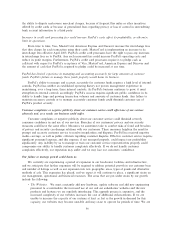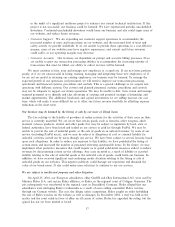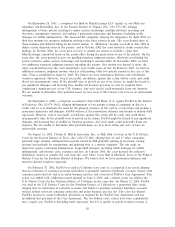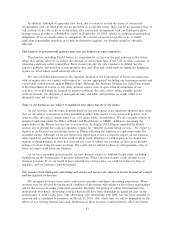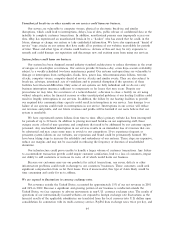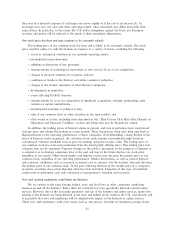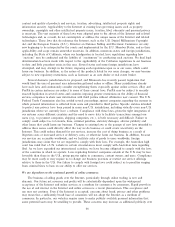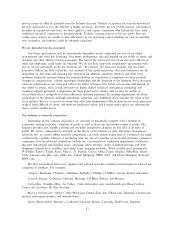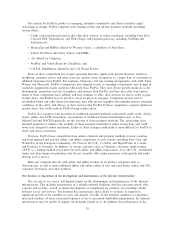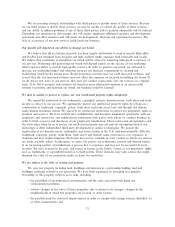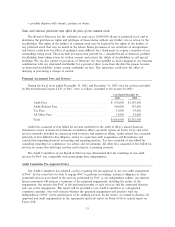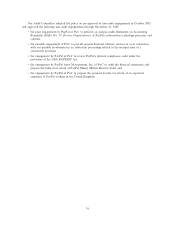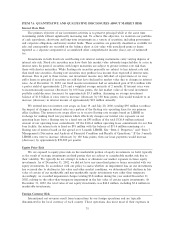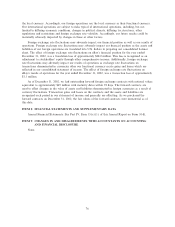eBay 2002 Annual Report Download - page 68
Download and view the complete annual report
Please find page 68 of the 2002 eBay annual report below. You can navigate through the pages in the report by either clicking on the pages listed below, or by using the keyword search tool below to find specific information within the annual report.content and quality of products and services, taxation, advertising, intellectual property rights and
information security. Applicability to the Internet of existing laws governing issues such as property
ownership, copyrights and other intellectual property issues, taxation, libel, obscenity and personal privacy
is uncertain. The vast majority of these laws were adopted prior to the advent of the Internet and related
technologies and, as a result, do not contemplate or address the unique issues of the Internet and related
technologies. Those laws that do reference the Internet, such as the U.S. Digital Millennium Copyright
Act and the European Union's (E.U.) Directive on Distance Selling and Electronic Commerce are only
now beginning to be interpreted by the courts and implemented by the E.U. Member States, and so their
applicability and scope remain somewhat uncertain. In addition, numerous states and foreign jurisdictions,
including the State of California, where our headquarters is located, have regulations regarding how
""auctions'' may be conducted and the liability of ""auctioneers'' in conducting such auctions. No Ñnal legal
determination has been made with respect to the applicability of the California regulations to our business
to date and little precedent exists in this area. Several states and some foreign jurisdictions have
attempted, and may attempt in the future, imposing such regulations upon us or our users, which could
harm our business. In addition, as the nature of the products listed by our users changes, we may become
subject to new regulatory restrictions, such as licensure as an auto dealer or real estate broker.
Several domestic jurisdictions have proposed, and Minnesota has recently passed, legislation that
would limit the uses of personal user information gathered online or oÉine. Many jurisdictions already
have such laws and continuously consider strengthening them, especially against online services. eBay and
PayPal in certain instances are subject to some of these current laws. PayPal may be subject to recently
enacted legislation in several states and countries imposing greater restrictions on the ability of Ñnancial
services companies to share user information with third parties without aÇrmative user consent. The U.S.
Federal Trade Commission also has settled several proceedings against companies regarding the manner in
which personal information is collected from users and provided to third parties. SpeciÑc statutes intended
to protect user privacy have been passed in many non-U.S. jurisdictions, including virtually every non-U.S.
jurisdiction where we currently have a website. Compliance with these laws, given the tight integration of
our systems across diÅerent countries and the need to move data to facilitate transactions amongst our
users (e.g., to payment companies, shipping companies, etc.), is both necessary and diÇcult. Failure to
comply could subject us to lawsuits, Ñnes, criminal penalties, statutory damages, adverse publicity and
other losses that could harm our business. Changes to existing laws or the passage of new laws intended to
address these issues could directly aÅect the way we do business or could create uncertainty on the
Internet. This could reduce demand for our services, increase the cost of doing business as a result of
litigation costs or increased service or delivery costs, or otherwise harm our business. In addition, because
our services are accessible worldwide, and we facilitate sales of goods to users worldwide, foreign
jurisdictions may claim that we are required to comply with their laws. For example, the Australian high
court has ruled that a U.S. website in certain circumstances must comply with Australian laws regarding
libel. As we have expanded our international activities, we have become obligated to comply with the laws
of the countries in which we operate. Laws regulating Internet companies outside of the U.S. may be less
favorable than those in the U.S., giving greater rights to consumers, content owners and users. Compliance
may be more costly or may require us to change our business practices or restrict our service oÅerings
relative to those in the U.S. Our failure to comply with foreign laws could subject us to penalties ranging
from criminal Ñnes to bans on our ability to oÅer our services.
We are dependent on the continued growth of online commerce.
The business of selling goods over the Internet, particularly through online trading, is new and
dynamic. Our future net revenues and proÑts will be substantially dependent upon the widespread
acceptance of the Internet and online services as a medium for commerce by consumers. Rapid growth in
the use of and interest in the Internet and online services is a recent phenomenon. This acceptance and
use may not continue. Even if the Internet is accepted, concerns about fraud, privacy and other problems
may mean that a suÇciently broad base of consumers will not adopt the Internet as a medium of
commerce. In particular, our websites require users to make publicly available personal information that
some potential users may be unwilling to provide. These concerns may increase as additional publicity over
66


